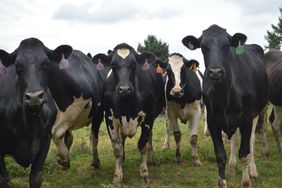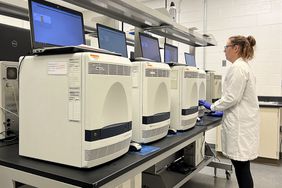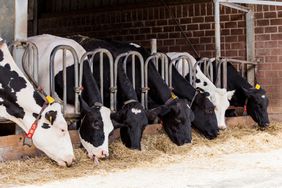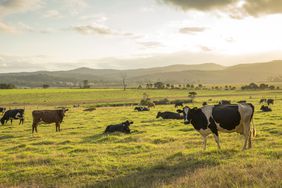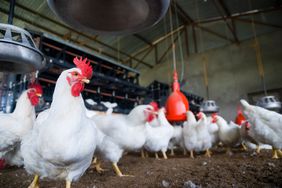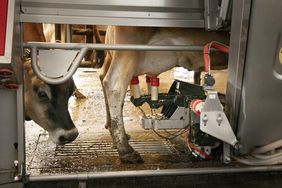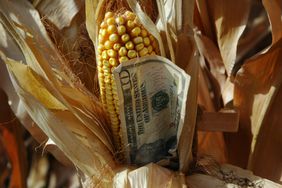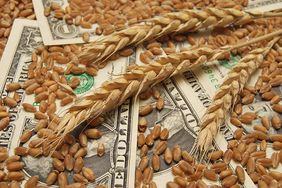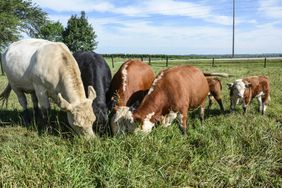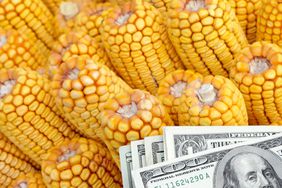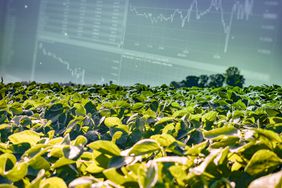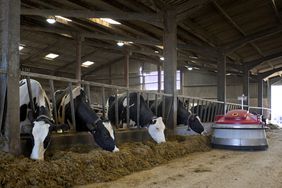:max_bytes(150000):strip_icc()/dairy-farm-building-with-two-grain-silos-saint-jean-ile-d-orleans-quebec-canada-north-america-533801854-57990cb03df78c3276bb52fb.jpg)
By Tom Polansek
CHICAGO, May 30 (Reuters) - U.S. farmers will be able to test bulk supplies of milk from their dairy cows for bird flu rather than milk from individual cows before gaining approval to ship them across state lines, the Agriculture Department said on Thursday, in a move aimed at expanding testing.
The change shows how government officials are trying to contain the disease while minimizing economic damage to farmers after the bird flu virus spread to cows and three dairy workers since late March. But some veterinarians warn the bulk tests may be insufficient.
The U.S. Department of Agriculture (USDA) in late April began requiring lactating cows to test negative before being shipped across state lines. It later said the order likely helped prevent the spread of the virus to new states.
USDA reported 2,492 pre-movement tests as of Wednesday but said that number does not equal the number of animals tested.
A pilot program for bulk testing milk aims to ease the burden of pre-movement testing while reducing the spread of the virus, said Eric Deeble, USDA's acting senior advisor for bird flu. Farmers can start enrolling in it the week of June 3, he told reporters on a call that confirmed details of the program first reported by Reuters.
USDA expects it may see an increase in herds testing positive because of the voluntary program and wants to encourage more testing, Deeble said.
“This program is not loosening restrictions,” he said.
Agriculture officials in six states told Reuters on Wednesday they were reviewing USDA's plans for the program.
USDA has confirmed the H5N1 virus in cattle in nine states. The U.S. Food and Drug Administration estimated that 20% of the U.S. milk supply shows signs of the virus, indicating a wider spread is likely.
“Once it has support and participation from farms, the USDA program could help reduce the threat of H5N1 in dairy herds, further mitigate risk among farm workers, and continue to protect our nation's commercial milk supply,” the International Dairy Foods Association said in a statement to Reuters.
Farmers said testing milk from bulk storage tanks offers the chance to collect a sample from all the cows within a herd and would be more efficient than testing samples from individual animals.
Under the new program, farms with herds that test negative for three consecutive weeks using bulk tank milk samples will be able to move cattle without additional pre-movement testing, USDA said. Farmers then need to submit milk samples from bulk tanks weekly to maintain their status, according to the agency.
USDA said in documents seen by Reuters that it could establish disease freedom in states or regions if enough farmers participate. If a herd tests positive in the program, there would be an epidemiologic investigation and evaluation of movement for animals considered to be low risk, according to the documents dated May 24.
The program would mostly benefit large dairies that move animals, veterinarians said.
Three weeks of testing milk from bulk tanks is not enough to confirm a herd is free of bird flu, though, said Gail Hansen, a veterinary and public health consultant. Samples from healthy cows could dilute samples from a small number of infected cattle in the same herd when their milk mixes in the tank, she said.
“It may give people a false sense of assurance,” Hansen said.
USDA said it is identifying states to participate in the pilot program, while state officials said they have questions about how it will operate.
“Indiana's biggest concern is: How will the information gathered be used? Any finding in Indiana could place us in the affected-state category, subjecting Hoosier producers to increased restrictions from other states,” said Bret Marsh, Indiana's state veterinarian, using a nickname for state residents.
Michigan, which has the most confirmed cattle infections, is interested, said Tim Boring, director of the state's Department of Agriculture and Rural Development. The last two dairy workers to test positive were in Michigan.
“One of the basic safeguards here is to look at restricting animal movement,” Boring said. “The last thing we want to be doing is moving sick cattle around in different farms and thereby spreading the disease further.”
(Reporting by Tom Polansek. Additional reporting by PJ Huffstutter; editing by Caroline Stauffer, David Evans and Rod Nickel)
